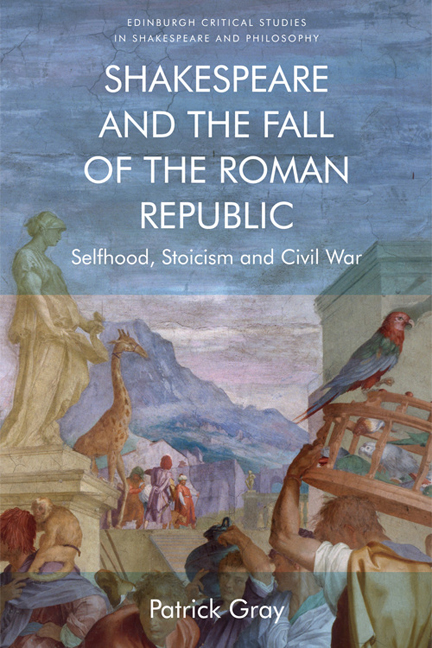2 - ‘The Northern Star’: Constancy and Passibility in Julius Caesar
Summary
In the general introduction, ‘Shakespeare and the Vulnerable Self’, I proposed that Shakespeare's concept of personhood rests somewhere between twentieth-century antihumanism such as that of Althusser and the Kantian dream of autonomy that such ‘Theory with a capital T’ sets itself against. Both extremes are too reductive. The individual is neither entirely transcendent, like some sort of disembodied deity, nor entirely determined, like a cog in a machine, but instead interdependent, at once agent and object, like a partner in a dance or an interlocutor in a dialogue. For an antihumanist such as Lacan, the other is primarily ‘the Other with a capital O’, an impersonal force or structure such as ‘language’ or ‘discourse’. For Shakespeare, however, the other is in contrast another consciousness: what Martin Buber calls a ‘thou’, as opposed to an ‘it’.
In this chapter, as well as the final chapter on Antony and Cleopatra, I turn for purposes of comparison to the literary criticism of Mikhail Bakhtin. Like Lévinas, Barth, Tillich and many other twentieth-century theologians, Bakhtin is deeply indebted to Martin Buber. These theologians, however, tend to emphasise only one instance of what Buber calls the ‘I–thou’ relationship, man's relationship with God, and to pass over what for Buber was equally important, man's relationship with his fellow man. By turning to a different disciple of Buber, Bakhtin, I hope to reintroduce the ‘horizontal’, so to speak, alongside the ‘vertical’. Citing Buber's description of himself as ‘a man among men’, Ewan Fernie finds an analogue in ‘the truth, as Hegel as describes it, of “I” that is “We” and “We” that is “I.”’ Christopher Tilmouth turns to Hobbes, and Jane Kingsley-Smith to Aristotle, for a similar pivot or reorientation away from the connection between man and God towards, as Buber says, the relations ‘between man and man’. Bakhtin for his part finds in Rabelais's ‘grotesque’ vision of the human body, as well as Dostoyevsky's gift for characterisation, a literary analogue of Buber's emphasis on human interdependence. Whereas Dostoyevsky focuses on relatively intangible questions of ethics, the intersection of ‘multiple consciousnesses’, Rabelais is more earthy and physical, emphasising the interrelatedness inherent in embodiment. Bakhtin sees in each author, however, Rabelais as well as Dostoyevsky, a preeminent artist of human passibility.
- Type
- Chapter
- Information
- Shakespeare and the Fall of the Roman RepublicSelfhood, Stoicism and Civil War, pp. 95 - 144Publisher: Edinburgh University PressPrint publication year: 2018

